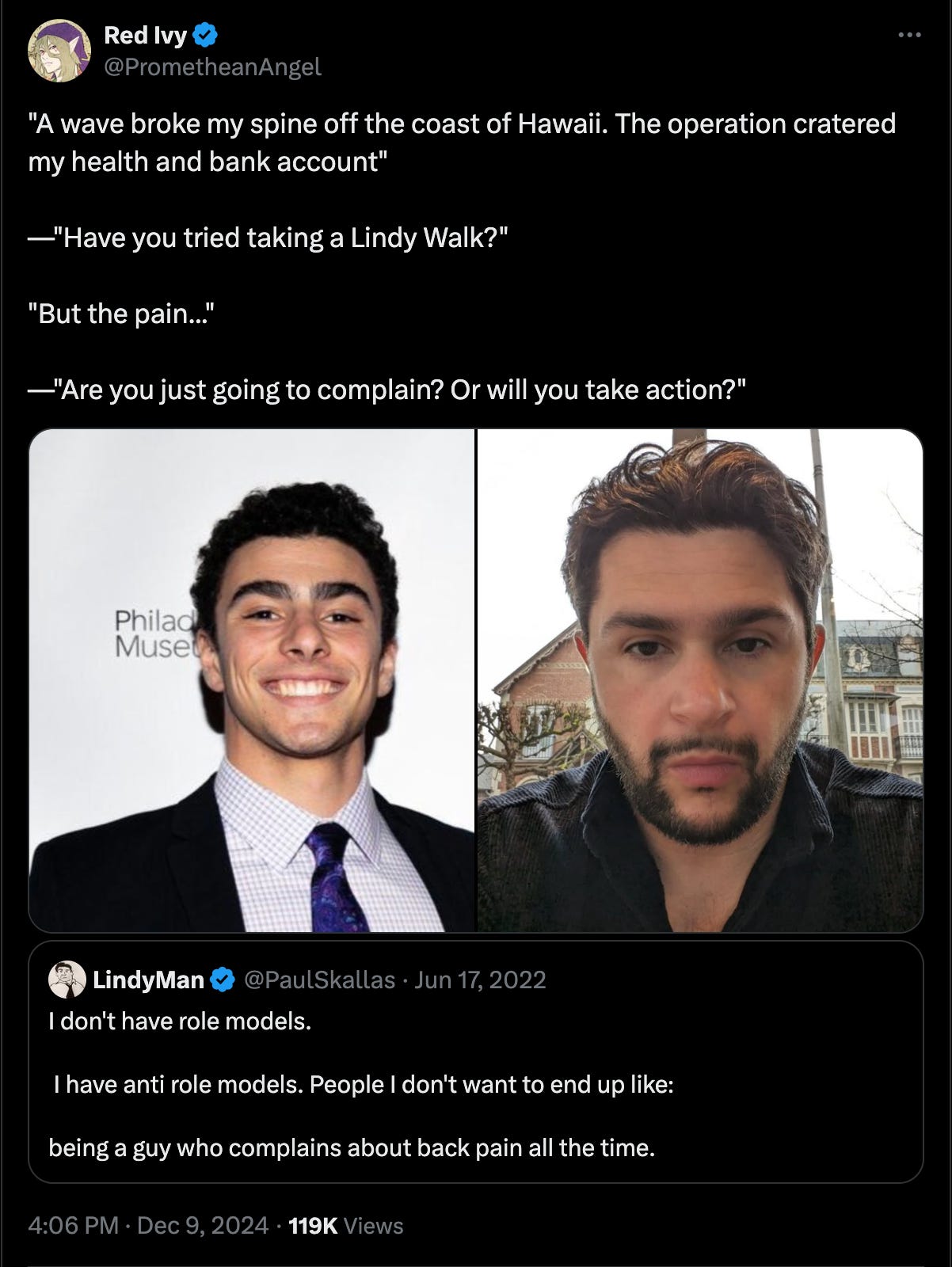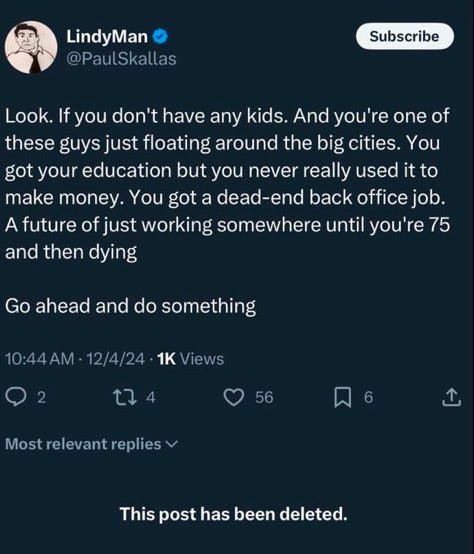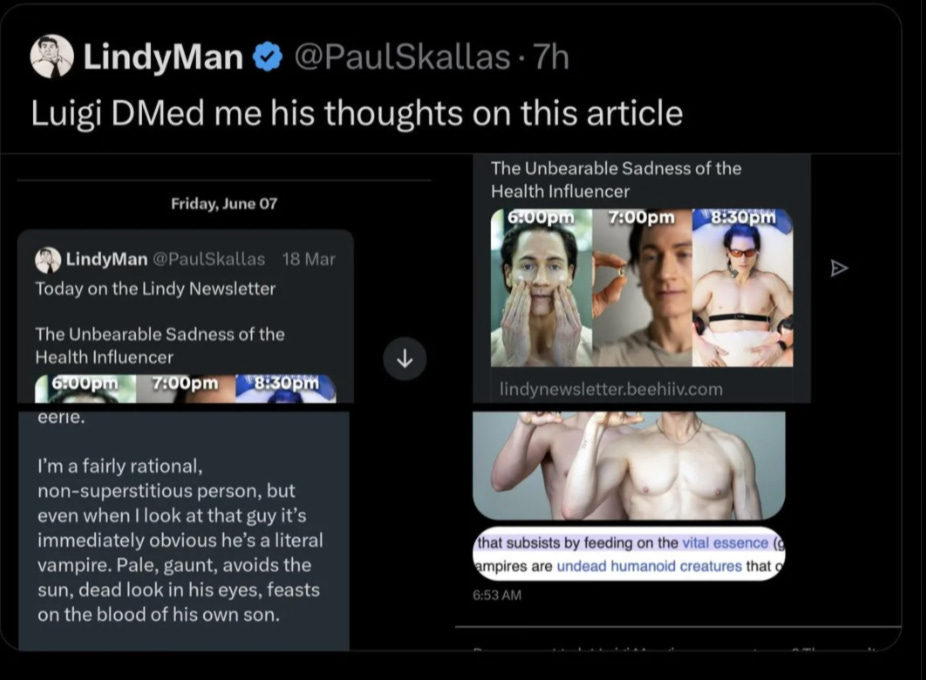When health insurance CEO Brian Thompson was shot and killed on the morning of December 4, speculation spread like wildfire as to the motivations of the then-unknown killer. Was he a hitman, there to settle some personal or corporate grievance? Was he a principled leftist, standing up for working people who are exploited by corporations like United Healthcare? Or was he something else entirely?
Less than a week later, we started to get our answer. Luigi Mangione was found at a McDonald’s with fake IDs matching those used by the shooter at a hostel, a manifesto, and a gun with a silencer. Before you could blink, his online records were scoured for hints as to his ideological motivations.
Unfortunately for those on the left who cheered him on, Mangione was no principled Marxist. Nor was he a MAGA Republican. He also wasn’t someone who had a personal gripe with United Healthcare at all. So what was he? Someone who, despite his good fortune in life, was deeply alienated by the modern world.
Much ink has already been spilled on Mangione’s ideological influences. The New York Times pointed to his interest in self-help content espoused by the likes of Andrew Huberman, while the San Francisco Standard wrote on his proximity to the corner of Twitter referred to as TPOT.
But I believe the most pertinent ideological inspiration when considering his decision to kill Brian Thompson is @LindyMan, or Paul Skallas. Mangione followed him on X (formerly known as and henceforth referred to as Twitter) and flagged his 2018 book Life & The Lindy Effect as something he wanted to read on Goodreads. Mangione also messaged him, and Mangione’s digital footprint is broadly aligned with Skallas’ ideas.
Paul Skallas is a writer who champions the concept (referred to as the Lindy effect1) that the longer something has lasted, the more likely it is to be worth keeping around. Skallas points to the past for inspiration in how to act today, and his naturalistic ideas have found an audience on Twitter, where Skallas has over 120,000 followers.
The corollary of idealizing the past is approaching life as it is structured today with a healthy dose of skepticism. Skallas sees himself as the leading writer speaking to the contemporary human condition; he claims to have “created a comprehensive theory of the 21st century condition through tweets” as well as “the practical philosophy of the 21st century: the phenomenology of the modern worker.”
One key aspect of Skallas’ “comprehensive theory” is the idea of the 4 hour life. In Skallas’ “4HL” framework, someone working a 9-5 spends 8 hours doing that, 8 hours sleeping, 4 hours going through the banal motions of life (meals, commuting, family obligations) so there are only four hours left with which they can truly live.
The prototypical “4HLer” lives their life in something Skallas calls the “consistency space,” within which the natural volatility and excitement of life is flattened and we are forced to repress ourselves in order to fit into the hierarchy of a workplace. Skallas spends much more time complaining about the way things are now than he does outlining a way for people to get from the “consistency space” to the “payoff space,” within which our actions have meaningful consequences.
It’s within this context that Skallas heard about Brian Thompson’s death on the morning of December 4, long before any of us had heard of Luigi Mangione. So he went on Twitter to express how, well, natural the whole thing felt in the face of the 4- hour life.
Skallas had no way of knowing that the murderer had followed him on social media, but he understood the impulse to “go ahead and do something.” To make a change in your life, to upset the system in the face of a “consistency space” that felt maddeningly static.
Mangione seems to be someone who was bothered by stasis, someone who cared about the world and wanted it to be better, wanted people to take more agency over their lived experiences. On Goodreads he wrote that the Unabomber should be understood not as a Luddite but as a political revolutionary, claiming that so many of Ted Kaczynski’s predictions about modern society had turned out to be prescient.
Mangione described himself as agnostic, but he worried about how the world was shifting away from serious religious practice. At age 15, he wrote a paper on how Christianity was able to triumph over Paganism in ancient Rome due to its “fitness-enhancing benefits for” Rome’s working class. And in April, Mangione cited an article on prominent New Atheist Richard Dawkins that walks through Dawkins’ ambivalence with a decline in Anglicanism. Mangione himself says that he’s “kinda jealous” of religious people who can use that to help them get through life.
When living in Japan earlier this year, Mangione thought seriously about the ways that Japanese society was set upon by modern ills and turned to Twitter to share his take.
He believed that urban Japanese society was structured in a fashion that was so wrong for our species that he referred to it as an evolutionary mismatch! And his prescription for fixing things is to return to a more natural mode of existence, to move away from fleshlights and towards Okinawan karate.
In an email to writer Gurwinder Bhogal, Mangione bemoaned the “scary lack of free will” he saw in Japan, citing an instance of police refusing to jaywalk in order to reach a man who was having a seizure. Mangione wanted people to be able to seize the day, to take power over their own lives.
While Gurwinder’s writing comes at things from a somewhat different angle compared to LindyMan, he too addresses the corrosive nature of contemporary life. Perusing the titles of Gurwinder’s newsletters shows that he also looks to the past to help us cope with the present (“Stoicism: The Ancient Remedy to the Modern Age”), believes we don’t take enough agency over our own lives (“Why You Are Probably an NPC”) and is deeply skeptical of modern changes in how we consume information (“TikTok is a Time Bomb”).
Mangione was a “founding member” of Gurwinder’s Substack. Mangione’s Substack account also lists eleven other newsletters that he read, ranging from rationalist Scott Alexander to internet provocateur Pico Paco to the Berkeley Center for the Science of Psychedelics. He had a wide range of interests, that’s to be sure, but his heart lied in trying to parse the human condition in the face of … everything that kills the spirit.
We know this because Mangione had his own Substack newsletter!2 The newsletter, which is private, was titled “Another Day, Another Play” with the subhead “Analyzing how to live well as a 21st century ape”.
This was Luigi Mangione’s struggle: figuring out how to cope with the pressures of a life that is not designed for us apes. He believed that we should life our lives in a natural way. In an unanswered Twitter DM to Skallas, Mangione shared his thoughts on Skallas’ blog post about health influencers like Bryan Johnson, whose project “Don’t Die” has Johnson trying to prolong his life as much as possible.
In his writing Skallas derides these health influencers as “pedd[ling] discipline alongside misery and isolation” and stating that living that way is “so bizarre and unnatural.” Mangione agrees that it’s unnatural, claiming that Johnson’s avoidance of the sun and blood plasma transfusions from his son make him “a literal vampire.” Mangione asks Skallas: “how can [Bryan Johnson] be obsessed with health and longevity but literally avoid the source of all life/energy on Earth (the sun)?”
Another place we can look to for some perspective on Mangione is his Reddit account. On Reddit, Mangione discussed his struggles with both back pain from spondylolisthesis and brain fog, his plan to live out of nothing more than a backpack for two months in Asia, and (back in February 2016!) his excitement for the as-yet-unreleased Pokémon GO.
In 2018 Mangione commented on a post about another Reddit user’s brain fog, sharing that he went through a similar experience:
It's absolutely brutal to have such a life-halting issue, especially since the issue itself wears down the critical/logical thinking mind you'd usually use to tackle it. The people around you probably won't understand your symptoms- they certainly don't for me. As each test comes back negative, the doctors won't have a fucking clue what's going on.
I'm sure you already know most of this, but basically I just want to say that you're not alone. Stay strong. If you ever want to talk, I'm sure there's a lot we can learn from each other's stories.
Those are the words of someone with empathy for others who thought rigorously about how to better his own life in the face of physical struggles. In another comment, Mangione was frustrated when reading a post from someone else who struggled with back pain whose doctors had recommended they avoid all physical activity: “Bizarre yet common advice from sedentary people who don’t live life to the fullest. No way to live your life as a 28 year old and so clearly not an option, imo.”
For Mangione, resigning himself to that sedentary life was not an option. So how did he adapt? And what brought him from being this thoughtful person to killing Brian Thompson and writing a (frankly unimpressive) manifesto?
I’m sure that more of his journey will come out in the coming months. It could be that experimentation with psychedelics to cope with chronic pain and brain fog led Luigi to get one-shot by the Mesoamerican 6D demon, losing his rationality in the process.
It’s not impossible to see where things go from there. Mangione existed in a part of the internet that disdained the banality of modern life. He had the resources to leave his job for a while, to cut off his family and do things his own way. He suffered from debilitating back pain and so the anti-corporate and anti-contemporary impulses that are part of the Lindy way were channeled towards the largest health-related company he could think of, UnitedHealthcare.
The biggest splash he could think of was to kill the CEO of UnitedHealthcare. He wrote in his manifesto that United was the fourth-largest company in the US by market capitalization, but that’s wrong; perhaps he confused revenue with market cap, as Wikipedia does currently list United as the fourth-largest company in the US by revenue. He says that “these parasites had it coming” and says they’ve “abuse[d] our country for immense profit because the American public has allwed [sic] them to get away with it.”
I would argue that corporate greed from health insurance executives is not the reason why, as Mangione states, the US has the most expensive healthcare system in the world but is 42nd in life expectancy. United Healthcare has 6% profit margins, about half the average among companies in the S&P 500. I agree with Matt Bruenig that private health insurance ends up ballooning costs, but that’s not because the CEO decided he just wanted more money at the expense of the American public.
Mangione’s manifesto acknowledges his own lack of expertise in the matter. He writes: “Obviously the problem is more complex, but I do not have the space, and frankly I do not pretend to be the most qualified person to lay out the full argument.” He makes a couple of opaque references to Rosenthal (Elizabeth Rosenthal?) and Moore (Michael Moore?) for further information on the subject.
I don’t believe that Luigi Mangione killed Brian Thompson because of Paul Skallas. But Mangione was someone who felt deeply disaffected with modern ways of living, and Skallas’ writings on this alienation resonated with him. Looking to Skallas can give us insight into what could bring someone like Luigi Mangione to shoot a CEO.
The Lindy Effect can be traced back to author and statistician Nassim Taleb, who discussed the idea in his book Antifragile and himself got it from a similar idea that mathmetician Benoit Mandlebrot wrote about in 1982. Taleb and Skallas have bonded over their shared appreciation for all things Lindy.
The newsletter, which was started eight months ago, is listed under the name Luigi and the username @anotherdayanotherplay, which was also used as his Substack username and in the URL for a private Wordpress site that his Facebook account linked to.




















This was an excellent read. Although there has been much digging into Luigi's life and potential influences/motivating factors that have come to life, I think this piece really nails a great portion of the likely ideological inspiration that led to the action he took. "Mangione wanted people to be able to seize the day, to take power over their own lives." Interestingly I've noticed he's signed many of his letters from jail with "Carpe Diem". Pretty small observation but it's not exactly the most common sign-off and I just feel it emphasizes that your insight into Mangione's philosophy is really on the nose.
Although the story is months old at this point, it has still left me incredibly perplexed today. Only LM himself can tell us why these were the actions he chose, why United/BT was targeted in particular, etc. Perhaps we will never hear directly what he has to say, aside from the brief manifesto. But if that is the case, I believe this is the best we've got. I'm wondering in the time since you posted this, do you have any other insight into how Mangione's ideological influences may have led him down the path he chose (if you've spent time even pondering the topic, that is)? Would love to hear if you have, thanks.